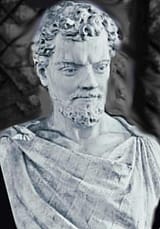>>16743094
Most of the development of this was done by the Romans.
>Titus Lucretius Carus (/ˈtaJtəs luːˈkriːʃəs/ TY-təs loo-KREE-shəs; Latin: [ˈtitus luˈkreːti.us ˈkaːrus]; c.99 – October 15, 55 BC) was a Roman poet and philosopher. His only known work is the philosophical poem De rerum natura, a didactic work about the tenets and philosophy of Epicureanism, which usually is translated into English as On the Nature of Things—and somewhat less often as On the Nature of the Universe
>De rerum natura was a considerable influence on the Augustan poets, particularly Virgil (in his Aeneid and Georgics, and to a lesser extent on the Eclogues) and Horace.he work was almost lost during the Middle Ages, but was rediscovered in 1417 in a monastery in Germany by Poggio Bracciolini
>>Greenblatt tells the story of how Poggio Bracciolini, a 15th-century papal emissary and obsessive book hunter, saved the last copy of the Roman poet Lucretius's On the Nature of Things from near-terminal neglect in a German monastery, thus reintroducing important ideas that sparked the modern age
>It played an important role both in the development of atomism (Lucretius was an important influence on Pierre Gassendi) and the efforts of various figures of the Enlightenment era to construct a new Christian humanism
>To prove this position he called upon the atomism of Democritus, so as to demonstrate that the material universe was formed not by a Supreme Being, but by the mixing of elemental particles that had existed from all eternity governed by certain simple laws. Lucretius' task was to clearly state and fully develop these views in an attractive form; his work was an attempt to show that everything in nature can be explained by natural laws, without the need for the intervention of divine beings
